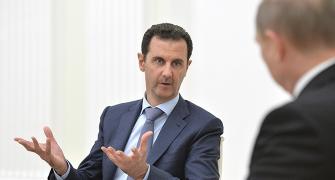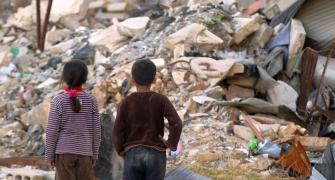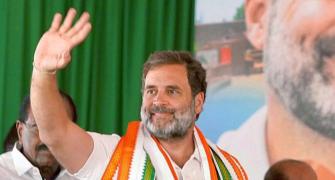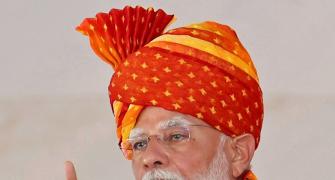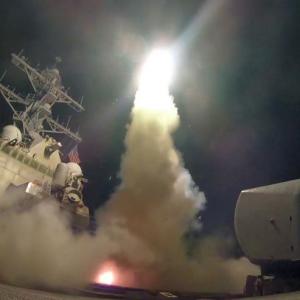'Every single American act to weaken Syrian forces would only tilt the military balance in favour of ISIS whom Trump pledges to vanquish from the face of the earth,' says Ambassador M K Bhadrakumar.
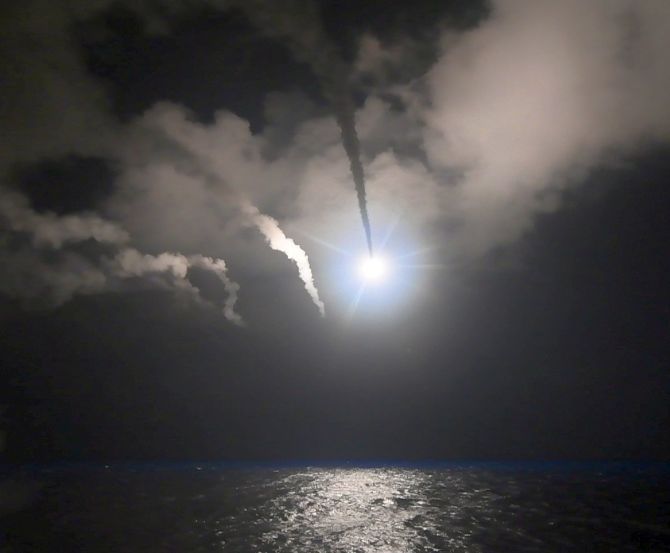
Although Bill Clinton and Donald Trump are different in some ways, the structural analogy of the two American cruise missile attacks -- on Afghanistan on August 20, 1998 and on Syria on April 6, 2017 respectively -- cannot be brushed aside.
Clinton ordered the strike as retaliation for Al Qaeda's bombings on the US embassies in Kenya and Tanzania killing 12 American nationals, whereas Trump ordered Thursday's strike, according to the Pentagon, as a 'proportional response' to the Syrian government's 'heinous act' of use of chemical weapons in Idlib province two days earlier against civilians and 'intended to deter the regime from using chemical weapons again.'
Where the analogy holds fundamentally could be that both Clinton and Trump acted as beleaguered presidents.
The missiles were launched on Afghanistan only three days after Clinton testified on the Monica Lewinsky scandal while the attack on Syria took place on a tumultuous day in American politics when Devin Nunes, Trump's chief ally on the Congressional committees investigating the president's connections to Russia, stepped aside from the inquiry, leaving the White House extremely vulnerable.
Both Clinton and Trump stood to gain by shifting attention away from the prevailing narrative in American politics.
However, no matter motivations, attacks on sovereign countries without clear-cut politico-military objectives can be risky.
Al Qaeda reacted with the 9/11 attacks.
Trump's move is also fated to be consequential.
Further disarray in the war against terrorism can affect international security.
Unsurprisingly, the UK and France feel uneasy.
British Foreign Secretary Boris Johnson has warned the US not to rush into a confrontation against the Syrian government.
Johnson said the top priority should be complementary peace talks and passing a United Nations resolution to investigate Tuesday's attack in Idlib.
'It is very important to try first to get out a UN resolution,' he said.
Jean-Marc Ayrault, the French foreign minister, echoed that view, saying: '(The first stage) is not to go in ourselves, under the pretext that the US president may have a rush of blood to the head, and get onto a war footing.'
Ironically, in an identical situation in 2013 when Barack Obama was contemplating a strike on Syria, Trump himself had felt agitated, tweeting furiously and repeatedly:
'A GAIN, TO OUR VERY FOOLISH LEADER (Obama), DO NOT ATTACK SYRIA - IF YOU DO MANY VERY BAD THINGS WILL HAPPEN & FROM THAT FIGHT THE U.S. GETS NOTHING!'
'President Obama, do not attack Syria. There is no upside and tremendous downside. Save your "powder" for another (and more important) day!'
'Let the Arab League take care of Syria. Why are these rich Arab countries not paying us for the tremendous cost of such an attack?'
Funnily, Trump insisted that if at all, Obama should seek Congressional approval first. He tweeted: 'The President must get Congressional approval before attacking Syria-big mistake if he does not!'
Again, just a week ago, US Secretary of State Rex Tillerson said Syrian President Bashar al-Assad's future should be left to the Syrian people. Now both he and Trump feel Assad must go.
Clearly, Trump has existential considerations weighing on his mind.
The biggest challenge ahead will be to avoid a collision course with Russia.
The Kremlin's reaction has been exceptionally sharp. Presidential spokesman Dmitry Peskov said on Friday: 'President (Vladimir) Putin regards the US attacks on Syria as an aggression against a sovereign State in violation of the norms of international law, and under a trumped-up pretext at that.
'Putin also sees the attacks on Syria by the US as an attempt to divert the international community's attention from the numerous casualties among civilians in Iraq.'
'The fact of the destruction of all chemical weapons stockpiles has been recorded and confirmed by the OPCW, a specialised UN unit.'
'At the same time, in Putin's opinion, total disregard for the use of chemical weapons by terrorists only drastically aggravates the situation.'
Yet, the Pentagon claims, 'Russian forces were notified in advance of the strike using the established deconfliction line.'
'US military planners,' the Pentagon added, 'took precautions to minimise risk to Russian or Syrian personnel located at the airfield.'
It seems the Russians did nothing to stop the US attack on the Shayrat airfield in Homs, situated virtually in the neighbourhood of their own main base at Hymemim, which is equipped with three formidable layers of advanced air defence systems.
Obviously, Moscow shied away from a military confrontation with the US. But serious issues arise.
The Shayrat airfield has been totally destroyed and all aircraft located there have been damaged. This becomes a blot on Russia's prestige too.
Therefore, the so-called 'deconfliction' proceedures with the US come under stress.
Do the Russians acquiesce with any future US attack on Syrian government forces?
This is important since the raison d'etre of the Russian military presence in Syria has come under a cloud.
Moscow's prevarications over Trump are denting its credibility.
Second, how far does the Russian military cooperate with the US on the ground hereafter in coming battles?
The battle for Raqqa, the self-styled capital of ISIS, and the US plans to set up 'safe zones' on Syrian soil are predicated in varying degrees on Russia's cooperation.
Of course, Moscow's hopes of forming an international anti-terrorist coalition with the US have been blown to smithereens.
Put differently, any US military operations in Syria will be outside the pale of the UN Charter and international law.
This, in turn, severely affects whatever residual chances exist for any US-Russia détente in a foreseeable future.
Tillerson's talks in Moscow next Wednesday will be taking place in a tense atmosphere.
US policies in Syria are in total shambles.
On the ground, the US' key allies are the Syrian Kurds whom Turkey regards as terrorists.
Yet, the US critically depends on the Incirlik base in eastern Turkey for staging its operations in northern Syria.
The total number of US military personnel in Syria is estimated to be in the region of 1,000.
The rebel groups whom the US trained and equipped have vanished into thin air.
Clearly, the US' capacity to influence the tide of war becomes even more limited after Thursday's attack on Syrian government forces.
The real paradox lies somewhere else though.
Every single American act to weaken Syrian forces would only tilt the military balance in favour of ISIS whom Trump pledges to vanquish from the face of the earth.
To be sure, Russia has heavy stakes in the fight against ISIS.
The subway attack in St Petersburg has only hardened the Russian resolve.
The good thing is that firstly, there could be some clarity in the Russian mind, finally, that waiting for Trump to show up at the barricades in Syria as comrade-in-arms has been a delusional hope.
On the other hand, Trump is intelligent enough to grasp that the missile strike on Thursday has been an act of dissimulation and it settles nothing in Syria.

